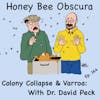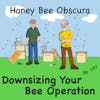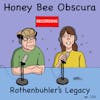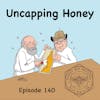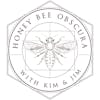Browsing Bee Books (153)

As the leaves fall and the bees nestle in for winter, many beekeepers find themselves next to a warm fire, a cup of tea in hand, flipping through the pages of their cherished bee books. Have you ever looked at your shelf brimming with bee books and...
As the leaves fall and the bees nestle in for winter, many beekeepers find themselves next to a warm fire, a cup of tea in hand, flipping through the pages of their cherished bee books. Have you ever looked at your shelf brimming with bee books and wondered, 'Will I ever read all of these?' You're not alone.
In this cozy episode of Honey Bee Obscura, Kim rejoins Jim in the studio to delve into the fascinating world of beekeeping literature. They explore the shelves of their personal libraries, sharing insights about what makes a bee book invaluable. From favorite authors to timeless publishers, they discuss the evolution of beekeeping knowledge and how the information in these books stands the test of time.
But beware, not all beekeeping techniques age like fine wine! Kim and Jim unravel how to discern timeless wisdom from outdated practices.
So, as you settle in for the evening, let your gaze wander over to your bee book collection. What hidden treasures do you own? Join us as Kim and Jim reveal their most treasured bee books and offer tips on building a meaningful library.
We can't wait to hear about the bee books that have inspired your beekeeping journey. Share your top picks with us after the episode!
______________________

Thanks to Betterbee for sponsoring today's episode. Betterbee’s mission is to support every beekeeper with excellent customer service, continued education and quality equipment. From their colorful and informative catalog to their support of beekeeper educational activities, including this podcast series, Betterbee truly is Beekeepers Serving Beekeepers. See for yourself at www.betterbee.com
______________________
Honey Bee Obscura is brought to you by Growing Planet Media, LLC, the home of Beekeeping Today Podcast.
Music: Heart & Soul by Gyom, All We Know by Midway Music, original guitar music by Jeffrey Ott
Cartoons by: John Martin (Beezwax Comics)
Copyright © 2023 by Growing Planet Media, LLC

Episode 153 – Browsing Bee Books
Kim Flottum: Jim, I haven't seen you for a while. It's good to see you here in the bookstore. I always like bookstores.
Jim Tew: Bookstores are nice places. They have that odor. What is the odor of a bookstore? That bookstore smell?
Kim: I've been laid up for a while, and the only books I've been looking at are on the shelf in my room here. I'm back, and it's good to see you again. What are you looking for there?
Jim: What am I looking for? I would like to find an old bee book. It was a two-book set, Beekeeping New and Old. It's a British book. I don't have any chance of finding it, Kim. It's just something to look for.
Kim: That's half the fun, just looking for it because you find something else. Hi, I'm Kim Flattum.
Jim: I'm Jim Tew.
Kim: We're here today with Honey Bee Obscura in some bookstore, and we're going to be looking for books and talking about all sorts of things about books.
Introduction: You are listening to Honey Bee Obscura, brought to you by Growing Planet Media, the folks behind Beekeeping Today podcast. Each week on Honey Bee Obscura, hosts Kim Flattom and Jim Tew explore the complexities, the beauty, the fun, and the challenges of managing honey bees in today's world. Get ready for an engaging discussion to delight and inform all beekeepers. If you're a long-timer or just starting out, sit back and enjoy the next several minutes as Kim and Jim explore all things honey bees.
Kim: You mentioned the book you're looking for. I got to tell you, I've been under the weather for a while here, and I'm starting to come back up. At least I am today, and I take every day that I can get. I'm looking at books here in my study, and I get a book, you look at it, or maybe you review it, or maybe you get it read if you're lucky, you put it on the shelf, and four years later, you see it again, and that's where I am with my books. I'm looking at books just to see what's here. You're looking for something specific.
Jim: I'm looking for something specific because you just need to have a reason. I got to tell you, during the pandemic years and recently, these books have become important to me because I'm not a young man, Kim, and I forget. You think, "Well, I read somewhere." I'm trying to write an article, "I read somewhere some fact about beekeeping. Which book was it?" Then you go on this hunt where you try to find where it was that you read something years ago that you want to be able to cite now. That's the thing I've been doing.
Kim: I do a lot of that. The other thing I do when it gets to be books is, "I know I have that book somewhere. I remember reviewing it. It was by-- what's his name The guy from, oh, somewhere out west, probably California. I can't remember. It had in it everything I wanted to know about the subject I was looking for. I got to find that book."
Jim: Yes. I hate that. Do you have your hundreds of books organized or are they just stuck on a shelf? Now I'm glad to hear that because that's part of the reason I have to search. Mine had the remnants of an organization back when I had more time and energy, but it's just remnants now, Kim. There's books on the floor, there's books on the shelves. When I'm looking for a particular book, it takes a while. Sometimes it can take me a month to figure out, "I don't have that book anymore. If I don't have that book anymore, how long has it been gone and where is it?" Kind of thing.
Kim: Yes. It sounds like you're looking over my shoulder at my books over here on the floor and on the shelves and falling off and in files. I know I'll find it some-- I don't know that I'll find it. Just you said it exactly the right thing is, "Did I have it? If I did, do I have it now? If I don't, where is it?" I can see I'm still getting back up to speed getting things done around here and in other places. I can see organizing a library here is pretty close to the top of my list of getting things done.
Jim: That ain't going to happen, Kim. I'm not organizing. I've got so many things on file right now, not the least of which are living bee colonies that aren't going to be living if I don't do something, but I should. I spend too much time. I can't get off the subject here, Kim, but I spend the same amount of time looking for pictures. "Oh, I remember making a picture of something that I need right now for some particular project I'm working on." Then here we go, the next two and a half hours looking at 3000 pictures and then finding one that will do, but not the one that I wanted. Books are like that. If I can't find the book that cited exactly what I wanted, can I find a book that cites it close enough? Then you move on. What I wanted to say, do you have a series, an author that really calls to you that you use a lot in your editing of your own books and reading and reviewing and writing?
Kim: I've got several publishers that I go to because I know they favor the things that I'm looking for at the moment. Wicwas Press is one of them and Northern Bee Books is another one of them for all bee books. There's Princeton University Press. Talk about top-shelf science. There is a good one right there. When I'm looking for hardcore science, I know where to go when I'm looking for how to, when I'm looking for history. There are some places I know where to start. If I don't find them there, well, it's supper time and we'll look tomorrow.
Jim: There's two kinds of searches in my life. There's old books, can you find it? Kim, there's an option that I guess we should mention here. There's an option for finding these books sometimes online in archival form. If you can't find a physical copy, you may be able to find an online copy. It's at something like archive.org or something like that. That's been helpful. In searching for this book, I want to read this title to you, Kim. Beekeeping New and Old Described with Pen and Camera by Harrod Hempshaw.
Kim: Oh, I know that name.
Jim: It's a giant book. I was surprised to find out that I only have half the series. It was a two-set series. I was listening while you were talking. I'm going to contact some of those distributors you mentioned to see if I can find the companion book. I don't buy as many bee books as I used to. They're online. They're everywhere. There's just a wealth of beekeeping information on every subject. As a younger man, I could buy every bee book that came out. I can't do that now. You and I both would have to have nothing in our house but books if we bought every one of them.
Kim: Yes. That book by Hempshaw-- Did I get the name right?
Jim: I think you did. We'll probably have somebody correct both of us, but I think you did.
Kim: You mentioned that book, and that it's a two-part book. You got one part. I'm not 100% positive that I don't have the other part hiding behind this pile of books here on the floor. I tell you what, I'm going to go look for that today. Next time we get together, maybe between the two of us, we'll have the whole book. What do you think?
Jim: Are you teasing me or is this a real promise, Kim? It sounds like you're not going to look for that book, but thanks for saying you are. I like that. I've used that book a lot for reference. I'm not selling the book, but when you're doing specific things for maybe an eccentric article you're writing on maybe tanging bees, it's not always easy to find information. That big book had information on tanging bees, and making stips. This is just not traditional things that I'm looking for. When you said you look for publishers, I tend to go more for authors that have written in genres that I like. Anything Eva Crane wrote, Honey; A Comprehensive Survey, The World History of Beekeeping, and Honey Hunting, she just wrote tomes on those things. I usually have a good shot of finding something there. I don't want to mention an author. There's authors everywhere. I don't have a favorite author. By mentioning a name like Dr. Crane, I don't mean to put them above all the other authors who've made contributions. Those kinds of books are really helpful. They review me, they make me come up with questions that stimulate me, and they reinvigorate me in beekeeping.
Kim: Boy, I tell you, I couldn't have summed that up better. Between you and me and the people listening here today, I hope that's what they should be doing. Take a look at those books on your shelf. If you don't have any on your shelf or not enough, there's always the internet. Take a look at what's out there. There's more than you can imagine.
Jim: Kim, while we're imagining, let's take a break and hear from our sponsor.
Betterbee: Are your bees ready to take on winter? Don't leave them vulnerable to Varroa mites. Introducing Api-Bioxal, the ultimate Varroa treatment for your honey bees. It's the only oxalic acid on the market that's EPA-approved to safely eliminate those pesky mites. Vaporize it. Dribble it. Do whatever it takes to ensure your Varroa numbers stay low as temperatures drop. Visit betterbee.com /oxalic today to learn more and secure your Api-Bioxal to send your bees into winter strong and healthy.
Jim: One of the places Kim, that I get information that I'm embarrassed to admit is old, but it's solid basic information. It's not even a book, it's old USDA pamphlets.
Kim: Oh, yes.
Jim: There's old pamphlets on transferring bees. There's old pamphlets on wintering bees and sellers. I go back because that was ground zero, that was the first information that was published and all of those pamphlets are archived on the web. It's not always books, Kim, sometimes there's information more in pamphlet form.
Kim: That USDA collection is invaluable, without a doubt invaluable. I'll tell you why very quickly. It's before it got into the collection, 50 people looked at it to make sure everything in it was right at least currently up to date when it was published.
Jim: Those things were highly edited and they were as correct as they could have been.
Kim: Yes.
Jim: They were usually very general articles. I've enjoyed using those things. In my academic life, people like Snodgrass, how did that guy ever get anything else done other than write those books on honey bee anatomy or insect anatomy, insect physiology? I use him a lot but he had his own style. Every little minuscule part of a bee, every little bump, every little hair had a name and then he abbreviated the name. You couldn't just look at the diagram, you had to break his code but once you break his code, it was absolutely insurmountable information. There's those kinds of books that are highly technical, highly specific, and highly valuable at that instant when you really need that information.
Kim: From those kinds of books come the other two groups of people who use that information. I'm thinking of The A, B, C, and X, Y, Z of Bee Culture by the Root Company and The Hive and The Honey Bee by Dadant. If you own all of those books, published it forever, you're right up to date. It's all as good as it gets. There's another way to go is to take the information that the scientists and those people have published, put it in a book, and then collect that book. I happen to have, he says carefully, I think most of the A, B, Cs ever published and most of the Hive and Honey Bees ever published.
Jim: That's a collection.
Kim: Well, it's a collection. Let me tell you about 60 books you'd have to fall through to find what you're looking for.
Jim: I want to say something here, Kim, at this point, and I want to say it politely and kindly but things change. When you're reading those old books, you need to know that sometimes the information that is contained there is no longer considered accurate or appropriate. Just going back and wrapping yourself in that warm ambiance of that musty-smelling book doesn't necessarily mean that what that author was telling you is the right way to go then. Reader beware. Things have changed, things have improved. We know more. Sometimes it's great for a review and sometimes it's great for taking you down the wrong path.
Kim: It's almost true what you say about a lot of things. It's out of date before the ankle's dry. You got to be careful. Anyway, I'm going to spend some time looking at books for a while, and I guess you are too looking for the one you're missing.
Jim: You didn't mean to open this can of worms, but somebody borrowed my A, B, C, and X, Y, Z of Beekeeping. That was my original bee book. I don't have it anymore. If I knew where it was, I'd ask for it back but I'd like to pursue looking for that book too, just strictly 100% for sentiment reasons.
Kim: Can I make you a deal? If I got it, we'll talk.
Jim: Oh, okay. Well, I guess you're going to want to talk money too. This is going to be a complicated deal. I won't bore the listeners with the specifics of the book, but I would like to replace that. As a young man Kim, 50 years ago you bought three bee books basically you bought The Hive and the Honey Bee, you bought A, B, C, and there was another book by Eckert & Shaw called Beekeeping that was primarily on the West Coast. It was West Coast beekeeping and that was it. Other than some USDA pamphlets, that was your library. You were of age, you were bibliographically prepared, and look at the number of spectacular books, vivid Color pictures, what great resources are available today to people just starting to buy their bee books.
Kim: Then you go to a meeting and find out that what you thought was right is now out of date and you better learn something else.
Jim: Oh, you had to tack that on. You had to tack that on. We talk about bees all the time, Kim. We talk about bees and anything related to bees on this podcast, but we need to say where we get our information is books. Even though I use the web just like everybody else listening, we need to use it every day, we're still going to the web to get what? Books, information. The web has changed things, but the web hasn't changed everything.
Kim: I couldn't have said it better. I think we should be about done here, aren't we?
Jim: I could talk about books for about 20 more hours but that's not going to work, is it?
Kim: Yes. Okay.
Jim: All right. Kim, I'm glad you're back, buddy. I know you're still not back at full power, but I look forward to working with you again.
Kim: Okay. I'll catch you next time. Thanks.
Jim: All the best. Bye-Bye.
[00:16:20] [END OF AUDIO]
New to Honey Bee Obscura Podcast?
Here are some great episodes to start with. Or, check out episodes by topic.







 As the leaves fall and the bees nestle in for winter, many beekeepers find themselves next to a warm fire, a cup of tea in hand, flipping through the pages of their cherished bee books. Have you ever looked at your shelf brimming with bee books and wondered, 'Will I ever read all of these?' You're not alone.
As the leaves fall and the bees nestle in for winter, many beekeepers find themselves next to a warm fire, a cup of tea in hand, flipping through the pages of their cherished bee books. Have you ever looked at your shelf brimming with bee books and wondered, 'Will I ever read all of these?' You're not alone.

